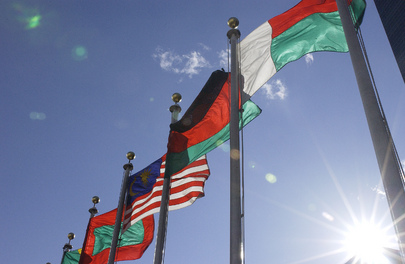Fight against global hunger set back 15 years, warns UN report
Progress fighting hunger worldwide has been set back 15 years, leaving around 733 million people hungry in 2023, equivalent to one in 11 globally and one in five in Africa, according to the latest UN Food Security and Nutrition report, published Wednesday.
Despite progress in combating stunting and promoting breastfeeding, global hunger stalled for three consecutive years, according to the report’s authors, who include the UN Food and Agriculture Organization, FAO.
Findings indicate that between 713 and 757 million people were undernourished in 2023, which is 152 million more than in 2019.
Here’s FAO Chief Economist, Maximo Torero:
“The bottom line is that we are still far off track towards the goal of ridding the world of hunger, food insecurity and malnutrition by 2030. Based on the current trajectory, our projections indicate that it will continue under the same conditions as today, we will be having 582 million people, which will still face hunger in 2030.”
Regional differences are stark, for instance in Africa, where hunger is rising and where one in five is affected.
Food insecurity is stable in Asia at 8.1 per cent but remains a significant concern since the region is home to more than half of those facing hunger worldwide.
Latin America has reported some progress, with 6.2 per cent of its population facing hunger. But Western Asia and the Caribbean saw rising food insecurity from 2022 to 2023.
Gaza: Exodus from Khan Younis compounds pressure on meagre resources
About 150,000 people fled Khan Younis in a single day on Monday following evacuation orders issued by the Israeli military there, UN humanitarians have said, warning that it intensified pressure on meagre food, water and places to seek shelter.
According to the UN aid coordination office, OCHA, some 1.9 million people – nine in 10 in Gaza – have been forcibly uprooted since 7 October, including many repeatedly displaced.
In a related development, a top independent human rights expert said on Wednesday that the Israeli authorities “continue to target human rights defenders” in the occupied West Bank, including East Jerusalem, before calling for the immediate release of two Palestinian human rights defenders held in “administrative detention”.
Omar al-Khatib and Diala Ayesh were arrested between October 2023 and March 2024, according to Mary Lawlor, Special Rapporteur on the situation of human rights defenders.
In a statement, she said that Mr. al-Khatib campaigns against the forced eviction of Palestinian families from the Jerusalem neighbourhood of Sheikh Jarrah, while Ms. Ayesh is a human rights lawyer who documents the detention conditions of Palestinian prisoners detained in Israel.
They and three other activists were among those “reportedly slapped, beaten, humiliated, sent from one prison to another” and made to sign documents in Hebrew “they could not understand”, added Ms. Lawlor, who reports to the Human Rights Council and is not a UN staff member.
Rising heat in Europe and Central Asia kills nearly 400 youngsters a year
Rising temperatures across Europe and Central Asia killed an estimated 377 youngsters from 23 countries in 2021. That’s according to the UN Children’s Fund, UNICEF, which found that that half died from heat-related illnesses in their first year of life.
The findings must be acted upon, UNICEF insists, because 92 million children are already exposed to frequent heatwaves in Europe and Central Asia where temperatures are rising at the fastest rate globally.
“Increasingly high temperatures can have serious health complications for children, especially the youngest children, even in a short space of time,” said Regina De Dominicis, UNICEF Regional Director for Europe and Central Asia.
In an alert, the agency said that heat exposure has “acute effects on children, even before they are born”.
It can result in pre-term births, low birth weight, stillbirth and congenital anomalies, the agency continued, adding that heat stress is a direct cause of infant mortality, can affect infant growth and cause a range of paediatric diseases.
As temperatures continue to rise, UNICEF urged governments across Europe and Central Asia to invest in early warning heat alert systems and to adapt urban design and infrastructure to minimize heat exposure.
Music composed and produced by Joachim Harris. All rights reserved
Source of original article: United Nations (news.un.org). Photo credit: UN. The content of this article does not necessarily reflect the views or opinion of Global Diaspora News (www.globaldiasporanews.com).
To submit your press release: (https://www.globaldiasporanews.com/pr).
To advertise on Global Diaspora News: (www.globaldiasporanews.com/ads).
Sign up to Global Diaspora News newsletter (https://www.globaldiasporanews.com/newsletter/) to start receiving updates and opportunities directly in your email inbox for free.




























